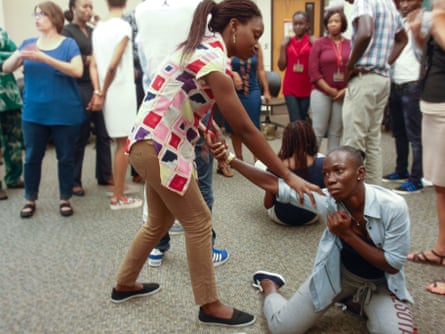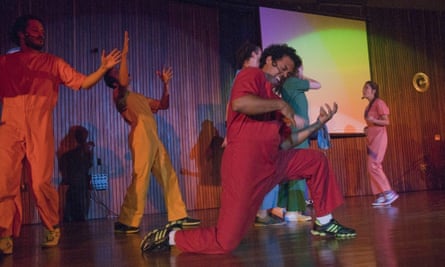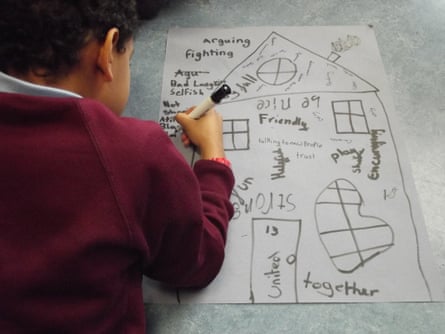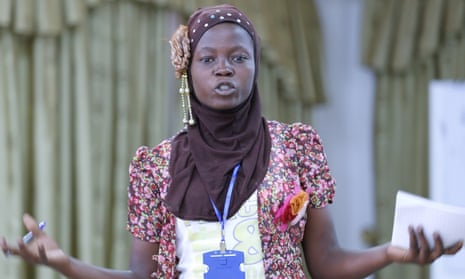A man in police uniform walks into a bar and corners a sex worker. He offers her a choice between giving up her body or her money – but she has no money. He pulls her away into a back room.
This scene happens twice in Lilongwe, Malawi. The first time is at night, with no sober witnesses. Months later, it is replicated in a play performed by sex workers to an audience of police officers. The action is paused and an officer leaps on stage to take the place of the victim. The scene plays out again and he suggests a different ending.
Theatre for a Change, a partnership between the UK and Malawi, facilitated the performance. One of a number of organisations around the world using theatre to educate about sexual consent, the company favours a technique called “legislative theatre”. This concept was developed by Brazilian dramatist, director and theorist Augusto Boal, who believed that putting the powerful in the shoes of the disempowered enabled an empathy that could effect legal change. In 1992, he wrote that theatre was “a form of knowledge” and “a means of transforming society”. Boal believed “theatre can help us build our future, rather than just waiting for it”.
The women in Malawi went on to perform their show in parliament and began to make the authorities challenge the notion that sex workers’ jobs imply their given consent. “That’s the ultimate aim of legislative theatre, that you end up tackling the lawmakers,” says Patrick Young, the executive director of Theatre for a Change, which also works to promote women’s rights in Ghana, the Democratic Republic of Congo and Bangladesh. He explains: “The next morning there were leaders in the main papers saying maybe we need to question our attitudes to sex work. We received further funding and have seen an improvement in relationships with the police, with women experiencing greater ease in reporting sexual violence.” The programme has now expanded to two more regions in central Malawi, Salima and Kasungu.

Boal’s legislative theatre is developed from his concept of “forum theatre”, a type of dramaturgy aimed at communities rather than policymakers, offering the chance to rehearse real-life situations. Boal’s methodology breaks down the traditional gap between audience and performers, who become “spect-actors” as they interact with each other.
This type of performance has influenced Cat’s Paw Theatre in north Wales, which delivers bilingual performances on the topic of consent for secondary schools. “Theatre in sex education animates theory learned in the classroom and places it into true-to-life scenarios,” says co-founder Andrea Wilder. “We put our audience into the role of detective.” A situation the teenagers will recognise, such as a group of young people at a party, is dramatised and the audience can then pause, join in or ask questions. “Hot-seating”, a partly improvisational theatrical technique, is used to interrogate the actions behind each character.
Myth-busting plays a significant role in Cat’s Paw’s performances. The audience of year 9 and 10 students are given handsets to respond to questions throughout the show. This allows them anonymity, relieving them of the worry of peer pressure. The performers can then use the students’ answers to untangle misconceptions about consent in relation to alcohol, drugs, age and relationships.
Teachers have commented that students engage far more with Cat’s Paw shows than with classroom presentations. “It’s about making the students aware of the long-term consequences and about increasing victims’ confidence to come forwards and report when offences have been committed,” Wilder says.
The radical invitation to change the nature of power underpins both of these companies’ work. “People are able to engage openly and without feeling like they’re being preached to or that this is an external or western agenda,” says Young. “It’s about groups discovering their rights and responsibilities rather than us simply telling them.”

In Venezuela, another outfit is using a very different technique to engage young people. Comedy isn’t usually associated with sex education beyond the ripples of awkward laughter it can create. But Improsexual embrace the laughter as they use improvised comedy to talk to teenagers about safe sex and consent. “Making teenagers laugh will make them remember it,” says founder Maria Teresa Urbina. “It’s playful pedagogy.”
Statistics of sexual violence in Venezuela are among the worst in the world. Because there is little encouragement to use contraception in this largely Roman Catholic country, sexual assault is inextricably tied to health issues. “Sex education comes too late and is very conservative,” says Urbina, who works as an embryologist and wanted to use her scientific background to find a novel way to raise awareness among teenagers.
Improsexual work with an eclectic mix of scientists, magicians and actors. The audience are asked to suggest titles, themes and answers to questions such as “What do you most want to know about sex, but are afraid to ask?” The narratives of the shows are then formed from their responses. After a magic show, a health presentation and three short sketches, a presenter takes to the stage to discuss the stories, clarify uncertainties and promote safe and consensual sex. Because of the company’s unique approach to education, Urbina says the number of consultations in local sexual health clinics has “increased significantly”. The productions have proved popular with teenagers: “Some like it so much that they come to watch the plays several times.”

The London-based organisation Tender targets even younger audiences, teaching consent to primary school children. Reports show that peer-on-peer sexual offences on school grounds increased from 386 in 2013-14 to 922 in 2016-17, without even counting instances of child abuse at home or from other adults in school. Many more offences go unreported.
“We know it’s happening,” says Mary Mobbs-Beal, youth engagement manager of the company. “We can’t turn a blind eye.”
When working with primary school children, Tender follow the NSPCC’s “PANTS” guide: “Privates are private. Always remember your body belongs to you. No means no. Talk about secrets that upset you. Speak up, someone can help.” According to Mobbs-Beal: “There’s nothing sexualised or graphic, but with those key principles you can keep a lot of children safe. It’s very easy for children to be coerced. You’re taught to share and respect, and it can be really confusing to know whether you’re allowed to say no. The workshops help students learn that through our body language and our words we can communicate about boundaries.”
Students are given age-appropriate scripted scenes, written in collaboration with the company’s youth board. The scenes are ones that children will find familiar. Two friends are playing a video game. One is pressing the other to play a different game. “At first it might seem to be about sharing but it’s actually about consent, saying no and early warning signs that someone is pressuring them into doing something they don’t want to do,” Mobbs-Beal explains. The scene then moves into supported improvisation. The children might be asked to repeat a scene with a different aim or outcome, while discussing excuses, responsibility and how to talk about an incident.
After the Harvey Weinstein allegations and the #MeToo phenomenon, sexual assault has permeated our everyday conversations. But the cases of abuse will continue. The World Health Organisation estimates that one in three women worldwide experience physical and/or sexual violence in their lifetime. Education is key to changing the statistics. With performances for audiences ranging from police officers to primary schoolchildren, these companies are – just as Boal hoped – using theatre to build a better future, rather than just waiting for it.

Comments (…)
Sign in or create your Guardian account to join the discussion